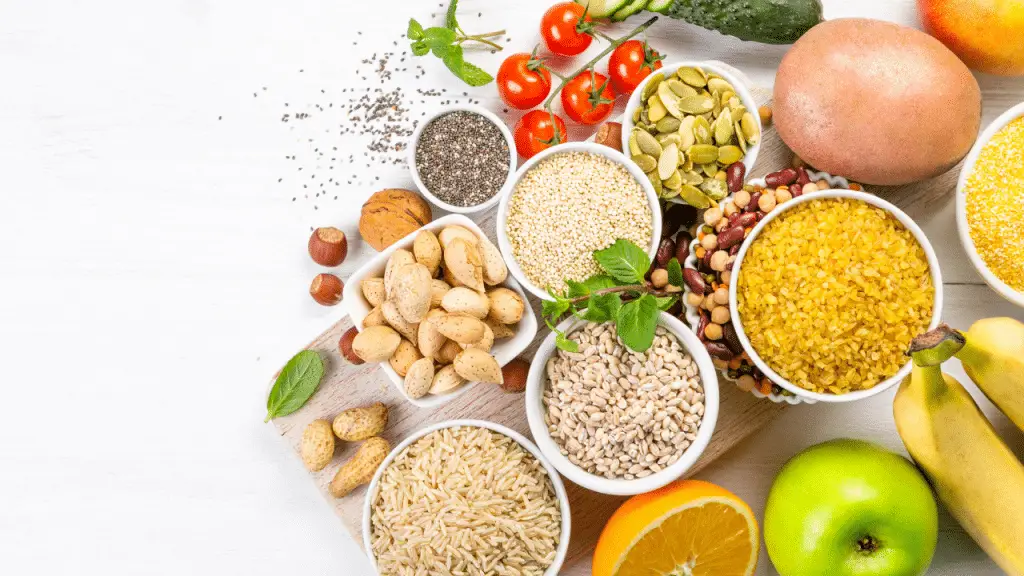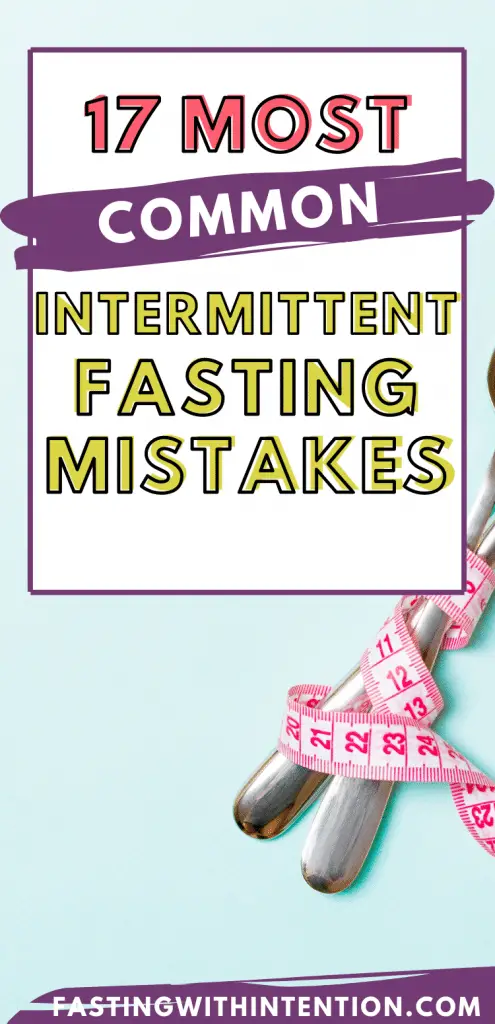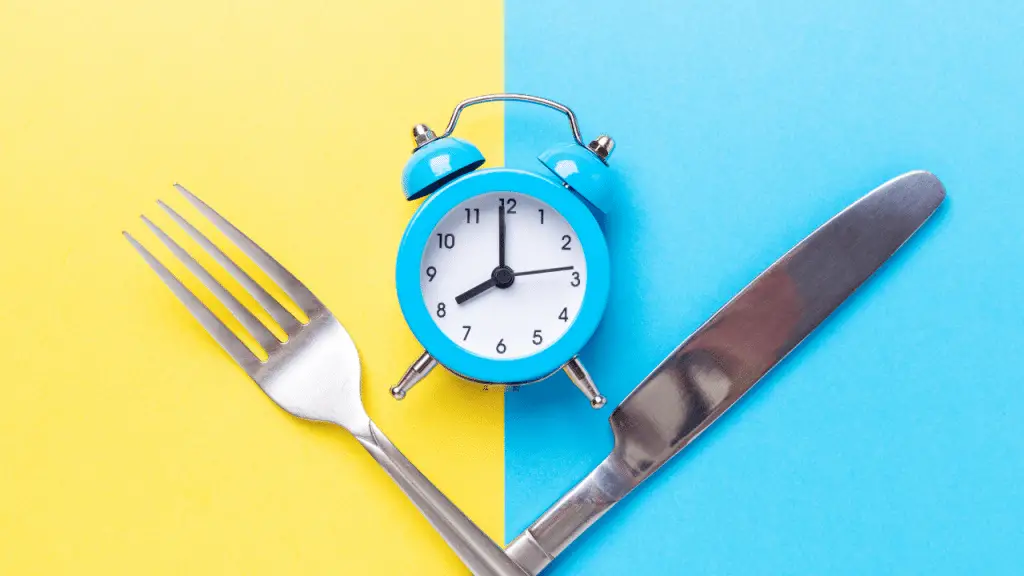I can almost guarantee that you learn something from my list of the most common intermittent fasting mistakes to avoid, even if you are experienced with intermittent fasting.
Top 17 Intermittent Fasting Mistakes to Avoid
When I consulted with a group of intermittent fasters to discover what they thought were the most common intermittent fasting mistakes to avoid, I loved the answers I received. I would have included some in this list, but some surprised me even though I had been practicing intermittent fasting for over two years and teaching women how to reach their health goals using fasting.

1. Starting With Unrealistic Expectations
Many people start with intermittent fasting to lose weight, for example. More often than not, they hope to lose weight fast. However, intermittent fasting is not a crash diet. Once you learn how to do it right, you WILL lose weight, but it can be a slow process. I have gone through months where I lost no weight. Then, I lost 2 pounds the next month. It takes time and perseverance. Read my post Intermittent Fasting for Weight Loss: 7 Tips to Help You Achieve the Results You Want for more help with intermittent fasting for weight loss.
How Fast Will You Lose Weight?
Most women can expect to lose 2-3 pounds a month, and that is after finding the intermittent fasting method that is most effective for them. Remember that a weight loss of 1 pound a week requires a calorie deficit of around 3,000 calories. I don’t know if you realize that, but that is almost the equivalent of 2 full days without food! Many people have unrealistic expectations because they don’t realize what it takes to lose weight.

2. Not Preparing For Intermittent Fasting
Jumping right in is better than not doing anything. However, one of the most common intermittent fasting mistakes to avoid is assuming that you can wake up one day, skip breakfast, and see results over time. Preparing for intermittent fasting is essential to increase your chances of success.
My two favorite approaches to preparing for intermittent fasting are:
- Modified fasting: I talk a lot about modified fasting on my blog. A modified fast is a short period during which you severely restrict your calorie intake (consuming around 40-50% of your regular calorie intake). It will help you kick-start the healing process and make fasting easier.
- Fewer carbs: Most of us do better on fewer carbs. You may notice that too many carbs increase your appetite. If that’s you, start preparing for intermittent fasting by consuming fewer carbs or even going on the keto diet for a week or two before starting intermittent fasting.
Furthermore, you must understand how intermittent fasting works, and how to pick your optimal intermittent fasting method.

3. Not Building Up Slowly
Starting with the OMAD Diet (One Meal A Day) may not be a good idea. At least, I wouldn’t recommend it. Instead, I suggest you build up gradually by starting with a 14-hour fasting window (after doing a modified fast or the keto diet for a week). Build up slowly as you gain confidence. Remember that your success will depend on building up to a 20-hour fast, at a minimum. Another excellent option is to start with a modified fast or a keto cycle to start getting used to using ketones for energy (as we addressed in mistake number two).
Read Intermittent Fasting: Is the Wait Worth the Weight? to learn why the starvation state matters (I know, starvation state sounds scary, but all it means is that your body runs on ketones).
4. Picking the Wrong Intermittent Fasting Method
It may be that you are fasting too long or not fasting long enough. Both can be counterproductive. If you fast too long, you may cause hormonal disruptions (particularly if you are a woman). If you don’t fast long enough, you may never enter ketosis, essential for weight loss and teaching your body to become metabolically flexible. Experimenting with the different intermittent fasting methods is essential to find the right one for you. Read my post How to Decide Which Intermittent Fasting Method Is Best for You for more guidance.
Also, check out my 30-Day Intermittent Fasting Transformation. The 30-Day program takes you step-by-step through the process of losing weight, kicking the cravings, and toning your body in just 30 days.

5. Quitting
The why I stopped intermittent fasting articles are all the rage these days. While intermittent fasting may not be for everyone, one of the common mistakes to avoid is assuming that intermittent fasting doesn’t work after trying the 16:8 method for a few weeks and quitting.
Let me emphasize that if weight loss is your goal and you are not losing weight on the 16:8 method, you may need to extend your fasting window. Moreover, I recommend you practice a modified fast once a month for a few months at first. It will decrease your chance of wanting to quit.
6. Thinking of Intermittent Fasting as a “Diet”
Many people start intermittent fasting, thinking they will return to regular eating after losing extra weight. Intermittent fasting is not a “diet.” It’s a lifestyle. The benefits extend beyond weight loss; you will probably feel good and want to continue anyway. However, if you go back to three square meals a day plus snacks, you will most likely lose any progress you made and regain your weight.

7. Breaking Your Fast Unintentionallly
Now, what I will tell you here may be a bit controversial. Most experienced fasters are very strict about what constitutes “clean fasting.”
Clean Fasting
If you want to practice clean fasting, you may only have water, black coffee, black tea or herbal tea, lemon water, or apple cider vinegar with water. Nothing else!
Keto Fasting
If you are practicing keto fasting, you may have some healthy fats and test your blood glucose to see how your body reacts. That’s what I do. For example, I decided that life i too short for black coffee, so I have some full-fat coconut milk and zero-calorie sweetener in my coffee. I sometimes eat a tablespoon of coconut oil if I feel too hungry. I like to test my glucose and my ketones to monitor my progress. You are good to go if your glucose is the same before and after your fatty coffee! No need to drink your coffee black!
Use my affiliate link for a 15% discount on the Keto-Mojo (the monitor I use to measure my glucose and ketones).

8. Picking the Wrong Foods to Break Your Fast
One of the intermittent fasting mistakes to avoid is to break your fast with junk food. While admittedly, I have done it occasionally, overall, you should ask yourself what to eat to break intermittent fasting. The main thing to remember is that you should break your fast with the most nutritious foods possible, also preferably without combining fasts and carbs. I created a post and a video to help you pick the right foods to break your fast: 15 Best Foods to Break Your Fast. Typically, I enjoy a Power Shake and a large salad daily when I break my fast.
9. Eating Too Much During Your Eating Window
If you are wondering, can I eat whatever I want while intermittent fasting and still lose weight? I want to offer a twofold answer: calories do matter whether you are intermittent fasting or not. You may not see much progress if you binge when breaking your fast. However, fasting enough to achieve optimal weight loss ketosis tends to reduce your desire to overeat.
Sit down to eat. Learn to listen to your body’s cues and eat when hungry. Consume nutrient-dense foods (you may enjoy reading Intermittent Fasting Food List: Yes and No Foods for Weight Loss Success).
If you want to lose weight, understand that calories matter even if you are practicing intermittent fasting. You most likely won’t have to count calories because restricting your eating window will allow you to decrease your calorie intake naturally. However, you won’t lose weight if you stuff yourself for 8 hours.
Calorie Deficit for Weight Loss
To lose 1 pound a week, you need a calorie deficit of 3,000 calories. I don’t know if you realize, but that’s almost the equivalent of two full days without food! I find that underestimating how much one is eating is the most common reason for not losing weight. Yes, some don’t lose weight because they don’t eat enough, but I don’t think this happens often. The most likely culprit is eating more than you think and having unrealistic expectations.

10. Not Drinking Enough Water
One of the intermittent fasting mistakes to avoid that I may not have thought about is not drinking enough water. Simply because I tend to drink a lot of water. However, many people forget to drink when they don’t eat (even when they do eat). Ensure you stay hydrated by drinking half your body weight in pounds in ounces of water. For example, if you weigh 160 pounds, drink 80 ounces of water. Your water intake can also be carbonated flavored water, lemon water, herbal teas, etc. Coffee doesn’t count as water intake!
11. Telling Everyone About Intermittent Fasting
That was another one of the more surprising intermittent fasting mistakes to avoid. It’s normal to want to talk about something new you are excited to learn. However, understand that many people may disapprove of intermittent fasting. They may try to discourage you and talk you out of trying it. Some misinformed friends may feel it will wreck your hormones or lead to eating disorders. Read my post Is Intermittent Fasting Bad for You to make sure you practice intermittent fasting safely.

12. Never Switching Things Up
Finding the best intermittent fasting method for you will require some experimentation. Once you experience the results you are looking for, you may still find it beneficial to switch things up. For example, if you find the Warrior Diet optimal like me, you may still occasionally benefit from a 24-hour fast. Or maybe a modified fast a few times a year. Our bodies can adapt to almost anything, so we must keep them guessing. It’s also why even now, in maintenance mode (having reached my goal weight), I like to ensure my body switches from using glucose to using ketones for energy. Read How to Keto Diet for Weight Loss and Health: Wait! It’s Not What You Think! if you are curious.
13. Eating Too Many Carbs
A moderate amount of carbs (between 50 and 200 grams daily) is optimal for most women. If you eat more than 200 grams daily regularly, you may find it harder to fast. I sometimes take a break from intermittent fasting one day during the weekend. That one day, I may eat paleo pancakes for breakfast, put honey in my coffee, have desserts, etc. I probably go over 200 grams of carbs every time. I find it harder to fast the following day. Keeping your carb intake lower will make fasting easier.
If fasting is too challenging, your hunger affects your behavior, and you feel you can’t keep going, try testing your ketones to see if you are producing any. Ketosis is what makes fasting doable. If you are not achieving ketosis, you need to eat fewer carbs.

14. Not Learning to Differentiate Between Hunger Signals
I emphasize that fasting is not just about shutting down your hunger signals. It’s about learning to differentiate between them. With practice, you will notice the difference between regular hunger, which is just an uncomfortable feeling in your belly, and hunger, which you should honor, which makes you feel weak or ravenous.
Some days, I can go without eating until 5 pm, because I feel great and the hunger doesn’t bother me. On other days, I eat an avocado or an entire salad for lunch because I don’t feel so well and can’t keep it up. I can do this confidently now because the practice has made me feel the difference.

15. Focusing Strictly On Weight Loss
As I mentioned, intermittent fasting has many benefits beyond weight loss. It will help you feel more energetic and focused. It may improve your sleep, your mood, and your longevity.
From NeuroScienceNews: “Evidence is accumulating that eating in 6 hours and fasting for 18 hours can trigger a metabolic switch from glucose-based to ketone-based energy, with increased stress resistance, longevity, and a decreased incidence of diseases, including cancer and obesity.”
Moreover, when it comes to weight loss, the scale is not everything. You may lose inches, but no pounds. Your face may look slimmer before the weight comes off. Our bodies are complex, and choosing to focus on pounds lost can be detrimental. Strictly worrying about weight loss is one of the most common intermittent fasting mistakes to avoid. Read Focusing on Weight Loss is Preventing You From Losing Weight and Other Reasons You Can’t Lose Weight for further help.

16. Comparing Yourself to Others
It may take you longer than you expect to reach your goals. If you see someone else getting more apparent results than you are, it doesn’t mean that intermittent fasting isn’t working for you. It simply means that your body is reacting differently. Learn to focus on your achievements and not let other people’s successes discourage you.
17. Eating Junk Food Instead of Nutrient-Dense Foods
Whether you practice intermittent fasting or not, choosing your foods wisely is always important. Consuming whole foods, rich in nutrients, will support optimal health. I recommend you make vegetables the bulk of your diet. Add in protein, healthy fats, grains, and legumes as needed.
Most Common Intermittent Fasting Mistakes to Avoid Video
Watch this video to see me explain the most common intermittent fasting mistakes to avoid.





